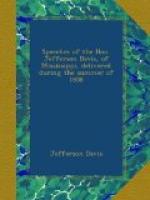Mr. Jefferson denominated the Democracy of the North, the natural allies of the South. It is in our generation doubly true; they are still the party with whom labor is capital, and they are now the party which stands by the barriers of the constitution, to protect them from the waves of fanatical and sectional aggression. The use of the word aggression reminded him that the people here have been daily harangued about the aggressions of the slave power, and he had been curious to learn what was so described. It is, if he had learned correctly, the assertion of the right to migrate with slaves into the territories of the United States. Is this aggression? If so, upon what? Not upon those who desire close association with the negro; not upon territorial rights, unless these self-styled lovers of the Union have already dissolved it and have taken the territories to themselves. The territory being the common property of States, equals in the Union, and bound by the constitution which recognizes property in slaves, it is an abuse of terms to call aggression the migration into that territory of one of its joint owners, because carrying with him any species of property recognized by the constitution of the United States. The Federal government has no power to declare what is property anywhere. The power of each State cannot extend beyond its own limits. As a consequence, therefore, whatever is property in any of the States must be so considered in any of the territories of the United States until they reach to the dignity of community independence, when the subject matter will be entirely under the control of the people and be determined by their fundamental law. If the inhabitants of any territory should refuse to enact such laws and police regulations as would give security to their property or to his, it would be rendered more or less valueless, in proportion to the difficulty of holding it without such protection. In the case of property in the labor of man, or what is usually called slave property, the insecurity would be so great that the owner could not ordinarily retain it. Therefore, though the right would remain, the remedy being withheld, it would follow that the owner would be practically debarred by the circumstances of the case, from taking slave property into a territory where the sense of the inhabitants was opposed to its introduction. So much for the oft repeated fallacy of forcing slavery upon any community.
If Congress had the power to prohibit the introduction of slave property into the territories, what would be the purpose? Would it be to promote emancipation? That could not be the effect. In the first settlement of a territory the want of population and the consequent difficulty of procuring hired labor, would induce emigrants to take slaves with them; but if the climate and products of the country were unsuited to African labor—as soon as white labor flowed in, the owners of slaves would as a matter of interest, desire to get rid of them and emancipation would result. The number would usually be so small that this would be effected without injury to society or industrial pursuits. Thus it was in Wisconsin, notwithstanding the ordinance of ’87; and other examples might be cited to show that this is not mere theory.




